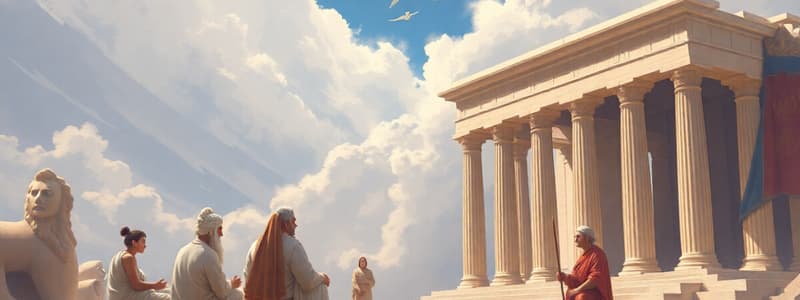Podcast
Questions and Answers
What was Socrates' primary belief regarding knowledge and wisdom?
What was Socrates' primary belief regarding knowledge and wisdom?
- True knowledge comes from within and self-realization. (correct)
- Wisdom is a collection of facts passed from teacher to student.
- Philosophy should be taught as a fixed set of beliefs.
- Knowledge is best shared in written form.
Which characteristic of Socrates contributed to his unique approach to teaching?
Which characteristic of Socrates contributed to his unique approach to teaching?
- He encouraged memorization as the key to learning.
- He rarely engaged in public political activity. (correct)
- He adopted a formal, lecture-based teaching style.
- He wrote extensively to share his philosophies.
Which philosophers primarily communicated Socrates' teachings?
Which philosophers primarily communicated Socrates' teachings?
- Epicurus and Diogenes
- Plato and Xenophon (correct)
- Pythagoras and Zeno
- Heraclitus and Aristotle
How did the Athenian education system address physical and literary training?
How did the Athenian education system address physical and literary training?
What legacy did Socrates leave regarding the practice of teaching?
What legacy did Socrates leave regarding the practice of teaching?
What was the primary environment for boys’ education in Ancient Athens?
What was the primary environment for boys’ education in Ancient Athens?
What did Socrates argue against in terms of passing knowledge?
What did Socrates argue against in terms of passing knowledge?
What was one reason Socrates did not write down his ideas?
What was one reason Socrates did not write down his ideas?
What did Socrates recognize as the true foundation of philosophy?
What did Socrates recognize as the true foundation of philosophy?
What aspect of Socrates' life influenced the evolution of Western thought?
What aspect of Socrates' life influenced the evolution of Western thought?
What was the primary focus of education for girls in ancient Greece?
What was the primary focus of education for girls in ancient Greece?
Which of the following subjects was NOT part of the higher education curriculum for young men in the 5th century BCE?
Which of the following subjects was NOT part of the higher education curriculum for young men in the 5th century BCE?
What was the significance of the trial of Socrates in Athenian society?
What was the significance of the trial of Socrates in Athenian society?
Which of the following was a primary source of knowledge about Socrates' methods and thought?
Which of the following was a primary source of knowledge about Socrates' methods and thought?
Why did Socrates refuse to accept payment for his teachings?
Why did Socrates refuse to accept payment for his teachings?
What was a consequence of Socratic teachings on Athenian culture?
What was a consequence of Socratic teachings on Athenian culture?
In which works did Plato feature Socrates as a central character?
In which works did Plato feature Socrates as a central character?
What was one reason Socrates was accused of corruption and disrespect during his trial?
What was one reason Socrates was accused of corruption and disrespect during his trial?
How did the education of young men in ancient Athens evolve during Socrates' time?
How did the education of young men in ancient Athens evolve during Socrates' time?
What was one key theme in Plato's writings about Socrates?
What was one key theme in Plato's writings about Socrates?
Flashcards are hidden until you start studying
Study Notes
Socrates and the Golden Age
- Socrates was a prominent figure in Athens during its Golden Age (circa 470 BCE).
- Known for his revolutionary ideas on wisdom and philosophy.
- Strongly believed true knowledge stems from introspection and not external teaching.
- Refused to write down his philosophies, emphasizing self-discovery over indoctrination.
- His teachings laid the foundation for modern philosophical schools, highlighting critical thinking.
Ancient Athenian Education
- Athenian education focused on physical and literary training for young males.
- Boys received physical education in gymnasiums, emphasizing physical prowess and military readiness.
- They learned reading and writing using the Greek alphabet, practiced on wax tablets, and memorized literature from Homer.
- Girls received informal education at home, focusing on household skills and childcare. Formal education, including reading and writing, was rare and required private tutors.
Rise of Higher Education
- Socrates and his students significantly impacted Athenian education during the 5th century BCE.
- Led to the emergence of higher education for young adult males.
- This shift emphasized intellect and education over physical strength.
- Young men studied logic, rhetoric, arithmetic, and musical harmonics.
Socrates: The Teacher and His Students
- Socrates' influence is primarily documented through the works of Plato and Xenophon, his students.
- Plato featured Socrates in several works, including Symposium, Apology, Crito, and Phaedo.
- Refusing to accept payment for his teachings, he advocated for poverty as indicative of true wisdom and morality.
- Socrates was a controversial figure due to his teachings. He was accused of disrespecting the gods and corrupting Athenian youth.
Socrates' Trial and Execution
- Socrates was put on trial in 399 BCE for impiety and corrupting youth.
- His students were shocked by the accusations.
- Xenophon described the lack of evidence supporting the charges against Socrates in his work Memorabilia.
Studying That Suits You
Use AI to generate personalized quizzes and flashcards to suit your learning preferences.




